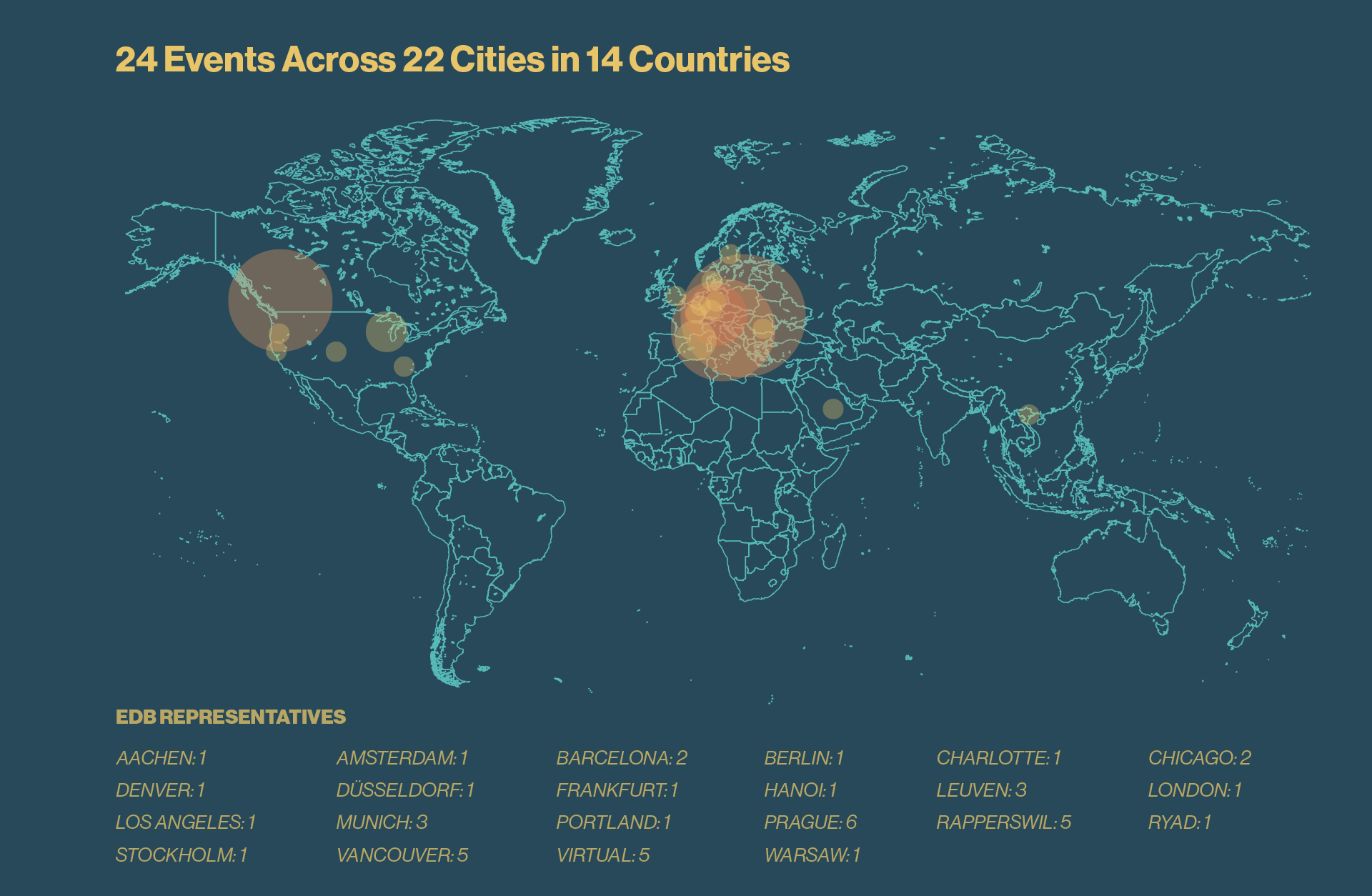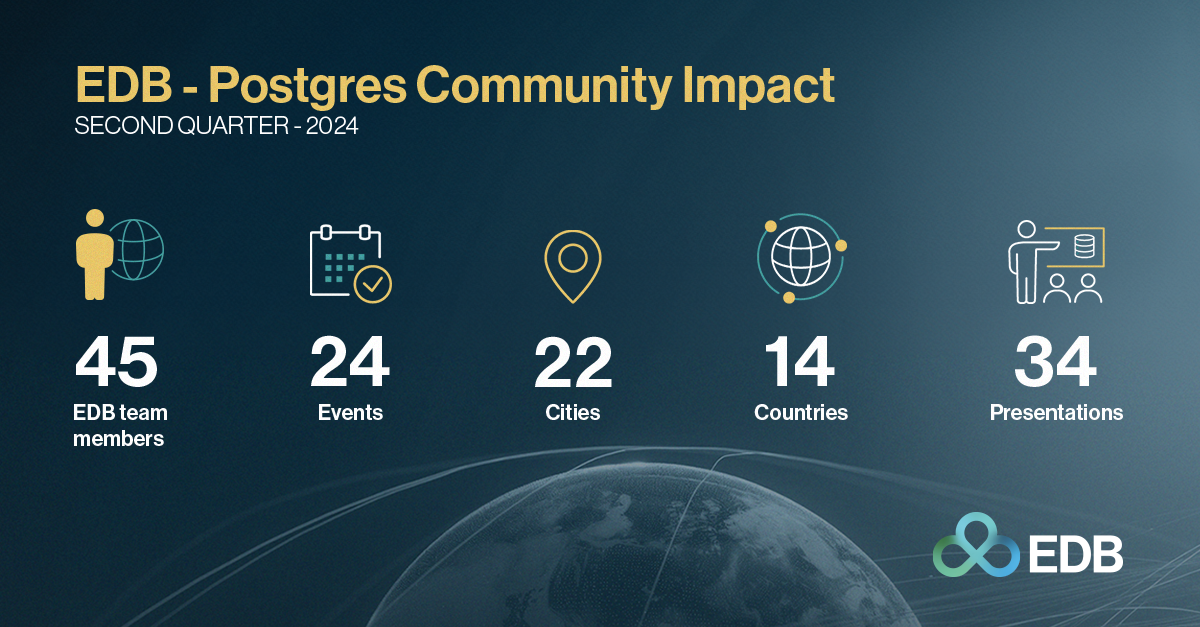EDB is proud to be an active member of the vibrant open source community, and we are committed to sharing our Postgres expertise at events across the world.
In Q2 2024 alone, 45 EDB team members participated in 24 events across 22 cities in 14 countries, delivering 34 presentations. Our team covered topics ranging from AI and pgvector, Kubernetes, and High Availability to developer inquiries and JSON. Most importantly, we showcased the strategic role of Postgres as the future-proof data platform for the enterprise.

You may have seen our blog post from Q1 2024 celebrating EDB’s community contributions in eight countries, eleven cities, and at 14 events, giving 24 talks about Postgres and how to use it in the modern enterprise. Here are the topics that gained greater emphasis in Q2.
AI and pgvector
AI and pgvector were the key focus in talks given by Bruce Momjian, Gülçin Yıldırım Jelinek, and Boriss Mejias at the German NRW PUG, the Vancouver Developer Conference, and the Swiss Postgres Days.
The integration of pgvector into Postgres marks a major advancement in how organizations can leverage their data. As Gülçin explains, pgvector extends Postgres into a vector database, allowing users to leverage its capabilities within their existing infrastructure. This significantly simplifies the deployment and management of AI applications, as there's no need for separate data stores or complex data transfer processes.
The ability to operationalize vector extensions within Postgres, converting data into vectors and leveraging hybrid queries, ultimately opens up new possibilities for developing AI applications. From chatbots to sophisticated search functionalities, the potential applications of pgvector are vast, making it a game-changing capability.
As AI adoption continues to grow, so does the role of Postgres as the versatile and robust database supporting AI applications. By staying at the forefront of these advancements, we’re raising the bar on our commitment to empowering businesses with cutting-edge, flexible solutions and fostering innovation within the open source community.
Kubernetes and cloud-native architectures
At EDB, we’re champions of advancing Postgres solutions for cloud-native Kubernetes environments. This topic was central in presentations given by Gregory Pochodaj at the Red Hat Summit and Gabriele Barttolini at the Cloud Native Meetup in London.
CloudNativePG, a production-ready Kubernetes operator originally created by EDB and open sourced in May 2022, automates the deployment and management of Postgres on Kubernetes. It ensures that anyone can start using an entirely open source stack for Postgres in Kubernetes for all their applications, with all the freedom they demand. Beyond that, we introduced EDB Postgres Distributed for Kubernetes (PGD4K), which builds on CloudNativePG’s capabilities and simplifies the creation and management of EDB Postgres Distributed (PGD) clusters inside Kubernetes.
There’s a reason that EDB was the first Postgres company to become a Kubernetes Certified Service Provider (KCSP) and that three of our Postgres contributors have been named Data on Kubernetes (DoK) Community Ambassadors: We are deeply committed to pushing the boundaries of data workloads in cloud-native environments. Our involvement in these communities underscores our dedication to shaping the future of Postgres on Kubernetes.
Core DBA and developer concerns
Core DBA and developer concerns were addressed by Richard Yen, Boris Mejias, Vik Fearing, Nick Ivanov, Devrim Gündüz, and many others at the Belgian Postgres Conference in Leuven, at FOSS Asia in Hanoi, in Prague at the Developer Day, at the Swiss PG Day, and at POSSETTE (the former Citus Con).
In the Postgres community, DBAs and developers care most about performance, security, and scalability. DBAs work on optimizing queries, securing data, and ensuring reliable backups, while developers focus on writing efficient code and designing scalable schemas.
The community at large plays a huge role in addressing concerns on these matters. Through shared best practices, tools, and extensions, members help each other solve problems and improve their setups. Community initiatives, such as the new mentorship program introduced by EDB's Chief Database Scientist, Robert Haas, ensure PostgreSQL stays a powerful and secure database that meets everyone's needs.
The future of Postgres
As we look ahead to Postgres 17, it's clear that its evolution is guided by the vision and dedication of its builders. That perspective was at the heart of the talks that the team of Álvaro Herrera, Tomas Vondra, Rahila Syed, Robert Haas, Dilip Kumar, and Bruce Momjian gave at the annual Postgres developer conference in Vancouver.
The non-stop integration of advanced features, such as new JSON capabilities and better support for AI applications, speaks to Postgres builders’ drive to stay ahead of the curve. Builders are also focused on optimizing critical components like storage and logging systems to ensure Postgres can handle the demands of modern data-intensive environments with efficiency and reliability.
These community contributions are paving the way for Postgres to strengthen its position as a leading database solution. As proprietary databases face increasing scrutiny and decline, Postgres stands out as the reliable, flexible, and cost-effective alternative. What this trend ultimately underscores is a broader industry shift towards open source solutions that prioritize community-driven development and long-term sustainability.
Postgres in the enterprise
At the Nutanix Next conference in Barcelona and at the Data Innovation Summit in Stockholm, Kevin Dallas and Marc Linster discussed the strategic role of Postgres in the enterprise. They emphasized its significant cost advantage – approximately 80% less than Oracle – making it the smartest option for businesses looking to optimize their budgets without sacrificing performance.
Cost isn't the only advantage. It’s also the flexibility that sets Postgres apart, as it runs seamlessly across all major clouds, operating systems, and hardware platforms. This allows businesses to maintain control over their data and choose the best infrastructure, whether on-premises, in the cloud, or a hybrid setup. That adaptability is vital for enterprises aiming to stay agile and competitive in today’s fast-paced digital world.
Beyond flexibility and cost savings, Postgres is designed to handle the increasing demands of modern digital transactions. With a staggering 402.74 million terabytes of data created each day, businesses need a robust database for high transaction volumes and diverse data types, from JSON and location data to vectors for AI applications. Postgres supports complex, data-intensive applications on a single platform, simplifying data management and boosting operational efficiency. This is especially valuable as businesses integrate AI and advanced analytics into their operations.
Last, but certainly not least: Developers simply love Postgres. Consistently ranked as the top database, its open source nature attracts top talent to drive continuous innovation. With Postgres, enterprises not only get a powerful, flexible database, but also access to a vast pool of skilled developers to help them navigate the digital economy's challenges.
For all these reasons, EDB doesn’t just believe that Postgres is the future-proof data platform for the enterprise; we know it.

Events where EDB spoke about Postgres in April, May, and June 2024
April 2 in Berlin Open Source Data Infrastructure Meetup
- Gülçin Yıldırım Jelinek: Bringing Vectors to Postgres
April 3 in London at the CloudNative Meetup
- Gabriele Bartolini: From Zero to Hero: Scaling Postgres in Kubernetes Using the Power of CloudNativePG
April 9 in Hanoi at FOSS ASIA
April 12 in Munich at the German Postgres Conference
- Gülçin Yıldırım Jelinek: Bringing Vectors to Postgres
- Gianni Ciolli & Torsten Steinbach: Operational AI workload means Postgres Database workload
- Martín Marqués: Postgres native incremental backups and the future of backup tools
April 17 in San Jose at the PGConf San Jose
- Patrick Mottram: Operational AI Workload Means Postgres Database Workload
April 17 in Warsaw at the Open Source Day
- Marc Linster: New Frontiers for Postgres, the Most Loved, Most Wanted, and Most Used Database
April 18 in Portland at PDXPUG (Portland Postgres User Group)
- Mark Wong: What's New in PostgreSQL 17
April 14 in Chicago at the Chicago PostgreSQL Meetup
- Devrim Gündüz: VACUUM: From Your Head Down to Your Shoes
April 25 in Stockholm at the Data Innovation Summit
- Marc Linster: New Frontiers for Postgres
April 26 in Chicago at the PGDay
- Bruce Momjian: Beyond Joins and Indexes
May 6 in Denver at the Red Hat Summit
- Gregory Pochodaj: Postgres for OpenShift/ Kubernetes - For Fully Automated HA Databases
May 7 in Leuven at the Belgian Postgres Conference (PGConf.BE)
- Gianni Ciolli: Trusted Postgres Architect
- Vik Fearing: What is a SELECT?
- Tomas Vondra: Where Do the Performance Cliffs Come From?
May 15 in Aachen at the Postgres User Group Nord-Rhein Westfalen (PUG NRW)
- Gülçin Yıldırım Jelinek: Bringing Vectors to Postgres
May 15 in Düsseldorf at the DOAG (Deutsche Oracle Anwender Gruppe) and Exadata Conference
- Raphael Salguero: Wrap Up Your Postgres Environment With TPA
May 21 in Barcelona at Nutanix Next
- Kevin Dallas: Fireside chat with David Sangster, Nutanix COO
- Marc Linster: EDB Postgres - The Enterprise-Grade Data Platform for Today and Beyond
May 23 in Frankfurt at the CloudExpo Europe
- Gianni Ciolli & Torsten Steinbach: Operational AI Workload Means Postgres Database Workload
May 28-31 in Vancouver at the PostgreSQL Development Conference
- Álvaro Herrera : The road to new SQL/JSON features
- Bruce Momjian: Postgres and the Artificial Intelligence Landscape
- Dilip Kumar: Problem in PostgreSQL SLRU - And how we are optimizing it
- Robert Haas: How Autovacuum Goes Wrong: And Can We Please Make It Stop Doing That?
- Robert Haas: Advanced Patch Feedback Session (leader; invite only)
- Robert Haas: Patch Review Workshop (co-leader; invite only)
- Robert Haas: Making Postgres Hacking More Inclusive (organizer and panelist)
- Tomas Vondra and Rahila Syed: Intro to Hacking on Postgres
May 30 in Amsterdam at the PUG (Postgres User Group) Netherlands Meetup
June 1 in Los Angeles at the SQL Saturday in LA
- Bruce Momjian: Postgres at the Center of your Data Center
June 5 in Prague at the PostgreSQL Developer Day (P2D2)
- Boriss Mejías: PostgreSQL as a Vector Database
- Boriss Mejías: Understanding Consistency in PostgreSQL Replication
- Gülçin Yıldırım Jelinek: Bringing Vectors to Postgres with pgvector
June 7 in Charlotte at the South East Linux Fest
- Bruce Momjian: Explaining the Postgres Query Optimizer
June 11 at POSETTE (formerly Citus Con) a virtual event
- Boriss Mejías: Postgres Storytelling: What's going on with Synchronous Replication
- Bruce Momjian: Beyond Joins and Indexes
- Richard Yen: Scaling the Wall of Text: Best Practices for Logging in PostgreSQL
- Tomas Vondra: Where do the performance cliffs come from
June 11 in Riyadh at the Nutanix & EDB Data Summit Ryad
- Marc Linster: EDB Postgres: The Enterprise-Grade Data Platform for Today and Beyond
June 24 in Prague at the PostgreSQL Meetup
- Gianni Ciolli: Trusted Postgres Architect
- Tomas Vondra: Where do the performance cliffs come from
June 27 in Rapperswil at the Swiss PGDay 2024
- Gabriele Bartolini: Unleashing the Power of PostgreSQL in Kubernetes
- Gianni Ciolli: The Well-Tempered Elephant
- Gülçin Yıldırım: Jelinek: Bringing Vectors to Postgres
- Tomas Vondra: The past and the future of PostgreSQL community
- Vik Fearing: Window Functions Are Easier and More Powerful Than You Think
